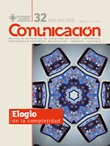From Organization to Coordination, the Change in the Public Spaces of Communication in the Arab World and its Connection to the Social Networks in the 2011 Movements
Main Article Content
Abstract
In this article we shall analyse the change in the public spaces of communication in the Arab world and its connection with the social networks during the recent revolutionary events in Tunisia and Egypt. The prestige of power linked to the discrediting of traditional mass media, following the usual mechanisms of disinformation and discredit. In contrast, participants in the riots responded with innovative and modern narrative strategies to counter disinformation and explanation of events.The satellite channels and Internet blogs prepared by public opinion have been joined by the social networks, which have organised specific actions, aided by Twitter and the spread of the mobile telephone. Young people’s appropriation of the new media, giving them a group awareness that galvanises the collective feelings of frustration and using them as a way of immediately connecting thousands of activists, has led the movement to prevail thanks to immediacy, surprise and the rapid unfolding of actions. The novel development has been both inter-class connection and the speed of action.
References
Abul-Magd, Z.; Perrier, A.E. (2006). Research Cultures in Local and Global Contexts: The Case of middle East Gender Studies. EEUU: Georgetown University. Center for Contemporary Arab Studies.
Alavi, N. (2005). We Are Iran: The Persian Blogs. EEUU: Nasrin Alavi Brooklyn: Soft Skull Press.
Beissinger, M.;, Putnam, H.W.;, Jamal, A.;, Mazur, K. (2013). “Who Participated in the Arab
Spring? A Comparison of Egyptian and Tunisian Revolutions”,.Princeton University. Taken from http://www.princeton.edu/~mbeissin/beissinger.tunisiaegyptcoalitions.pdf
El-Nawawy, M.;, Iskandar, M. (2007). Al-Jazeera: How the Free Arab News Network Scooped the World and Changed the Middle East. Colorado: Westview Press.
Fauad, W. (2010). Facebook y la juventud árabe. ¿Activismo social o liberación cultural? En AWRAQ. Revista de análisis y pensamiento sobre el mundo árabe e islámico contemporáneo: (pp. 30-52). Vol. 2. Madrid: Casa Árabe.
Gallissot, René (1990) “Mai 68: qu’est-ce qu’un mouvement social? Au-delà du mouvement ouvrier”,: L’Homme et la Société, 98, pp.87-108.
Ghada Abdel A. (2010). I Want to Get Married!: One Wannabe Bride’s Misadventures with Handsome Houdinis, Technicolor Grooms, Morality Police, and Other Mr. Not Quite Rights (Emerging Voices from the Middle East). Austin: Center for Middle Eastern Studies (University of Texas at Austin).
Kawakibi, S. (2010). Al-Yazira y la política exterior de Qatar. En AWRAQ. Revista de análisis y pensamiento sobre el mundo árabe e islámico contemporáneo. (pp. 61-78). Vol. 2. Madrid: Casa Árabe.
Lamloum, O. (2006). Al-Jazira. Espejo rebelde y ambiguo del mundo árabe, Barcelona: Hacer E.
Martín, G.; Bessis, S. (Ed.) (2010). Mujer y familia en las sociedades árabes actuales. Barcelona: Ediciones Bellaterra y Casa Árabe.
Miles, H. (2005). Al Jazeera: How Arab TV news challenged the world, London: Abacus.
Perceval, J. (2007). Entre el humor i el furor: sàtira i visió d’Occident en el mitjans de comunicació del món arabo-musulmà. En Quaderns del CAC: Consell Audiovisual de Catalunya (pp. 37-45). Vol. 27.
Perceval, J.; Simelio, N. (2014). La narratividad digital ante la lecto-escritura esquizofrénica: un desplazamiento hermenéutico. En Dosdoce. Vol. 6, February 25, 2014. Madrid: Gestión Cultural. Recuperado de http://www.dosdoce.com/articulo/opinion/2765/la-narratividad- digital-ante-la-lecto-escritura-esquizofrenica-un-desplazamiento-hermenéutico/
Rodenbeck, M. (1998). Cairo: The City Victorious. London: Picador.
Stratton, A. (2009). Muhayababes. Chicas con velo. El nuevo oriente Próximo: joven, cool y devoto. Madrid: 451 editores.
Valenzuela, J. (2011). De Tánger al Nilo. Crónica del norte de África. Madrid: Catarata.
Valenzuela, J. (12 octubre de 2003) Fátima en Fez. El País Semanal. Madrid: El País Ediciones. Recuperado de http://elpais.com/elpais/2013/05/27/eps/1369653833_616081.html .

